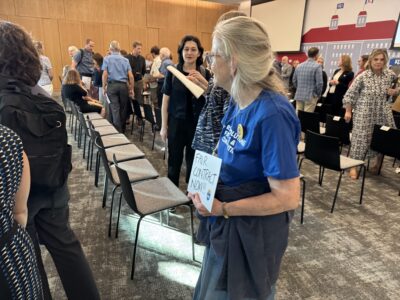KU considering $100M in new debt to build student housing facility or to purchase private apartment complex
Student housing, dining fees for next school year also proposed to increase by about 4%

photo by: John English, Special to the Journal-World
This file photo from April 13, 2016, shows Daisy Hill, including Oswald Hall, back left, Self Hall, back right, Hashinger Hall, front left, and Lewis Hall, front right, on the University of Kansas campus.
There are signs that the University of Kansas is getting more serious about building a new dormitory to help serve student enrollment that has grown during the last two years.
KU is seeking preliminary approval from the Kansas Board of Regents to issue up to $100 million in debt to either build a new student housing facility or to purchase an existing apartment complex in Lawrence, according to documents filed with the Regents.
The plans are still preliminary and would require several more steps of approval before any such project would emerge, but they are the most public sign yet that KU is moving toward a major student housing project.
“Additional on-campus housing is required to accommodate the growth and to further provide a more diverse variety of housing options,” KU said in a memo to the Regents.
KU has experienced two consecutive years of enrollment growth, with fall enrollment hitting a new high this year. But KU leaders have been wary of committing to a major new student housing project because universities across the country are worried about a “demographic cliff” that is expected to emerge in 2026.
The number of high school graduates nationally is expected to decline sharply in 2026, as births slowed significantly during the Great Recession of 2008. Now, 18 years later, the number of young adults that are the traditional age of college students is expected to drop significantly.
KU Chancellor Douglas Girod has said he wants to be careful that KU not commit to a major dormitory project only to see enrollment growth slow or even decline in the future. Girod has expressed some interest in KU buying private apartment complexes, which he said the university could more easily sell back to the private sector, if enrollment took a downward trend.
The bonding authority that KU is seeking would provide KU the flexibility to either build a new facility of its own or to purchase an existing apartment complex in the community. The memo to the Regents doesn’t specify which apartment complex KU might buy, but it provides some clues. The memo says KU would explore the purchase of an “existing leased apartment complex.”
As we’ve reported, KU currently is leasing space at Naismith Hall at 19th Street and Naismith Drive on the south end of campus and at the Here@Kansas complex, which is across the street from the football stadium at 11th and Mississippi streets.
As for where KU might build an entirely new student housing facility, the memo doesn’t say. However, Girod has said that a student housing apartment might be part of the KU Gateway project, which includes the renovations to the football stadium and the construction of a new convention/conference center as part of the stadium. Some preliminary discussions have included the idea of student apartments in the east parking lot of the stadium.
KU also potentially would have available space where Jayhawker Towers currently sits at 1603 W. 15th St. KU has largely closed that aging complex, just southwest of KU’s engineering school.
Regents at their Wednesday meeting this coming week are not being asked to approve the bonding authority, but rather are being asked to grant permission to KU to seek legislative approval for the bonding authority when the Kansas Legislature convenes in January.
Regents are expected to hear the request at their monthly meeting but not take final action on it until December.
The bonding request comes at the same time that KU and other Regents universities are proposing increases in their student housing and dining rates. KU for the 2025-2026 school year is proposing a $416 per academic year increase to its standard housing and dining plan program. That’s a 3.81% increase from current rates.
KU’s proposed rate increase is the largest among the six Regents universities, both in terms of dollar amount and percentage. Pittsburg State is next with a $340, or 3.79%, increase. Kansas State, the second largest university in the state, is proposing a $230, or 2.24%, increase.
Financial information provided to the Regents shows that KU’s housing system has posted solid numbers over the last two years, and KU officials are telling Regents that they need the rate increases to keep the system sound and ready for future capital improvement projects.
The housing system had operating revenues exceed expenses by about $1.3 million in fiscal year 2023 and by about $3.1 million in fiscal year 2024. The financial numbers also serve to put into perspective how much $100 million in new debt would really be for the housing system. Currently, KU has about $58 million in long-term debt for student housing. A $100 million bond issuance would more than double KU’s debt burden for student housing.
KU’s proposal also includes one significant change to the university’s dining program. KU currently offers students the option of a “declining balance plan.” For example, a student could pay for $440 worth of dining dollars and then use those dining dollars anytime during the course of the school year. KU is proposing to phase out those plans next school year, meaning students would have to choose a “meal swipe” plan. KU offers a trio of those plans — an unlimited number of swipes at KU dining facilities, 14 swipes per week or 10 swipes per week.
KU said the dining dollars plans created some food uncertainty for students who don’t properly budget their dining dollars. However, the elimination of the dining dollars plans does eliminate one lower-cost option for students. For example, the $440 dining dollars plan is much cheaper than KU’s cheapest meal swipe plan. The 10-swipe-per-week plan is proposed to cost $4,440 for the 2025-2026 school year.
Regents are not expected to give final approval to the proposed housing and dining rates at Wednesday’s meeting. Instead, Regents will be presented with the proposals and are expected to act upon them in December.







